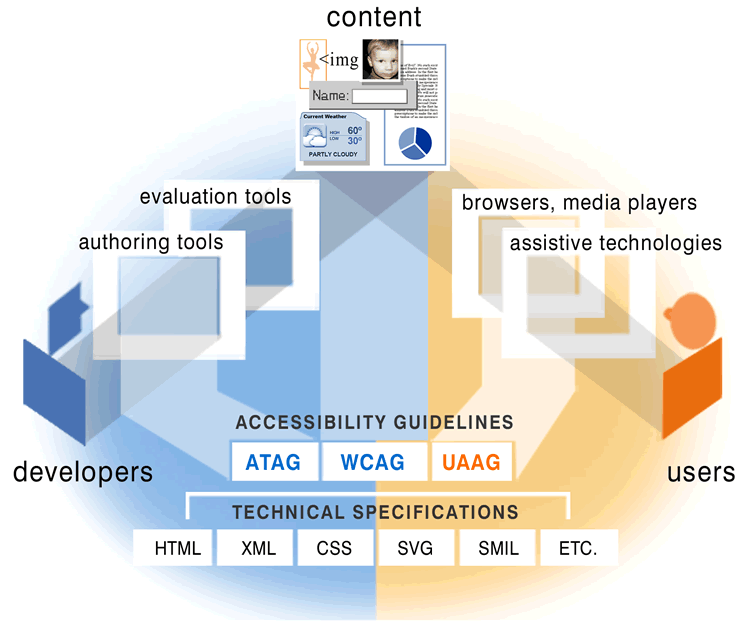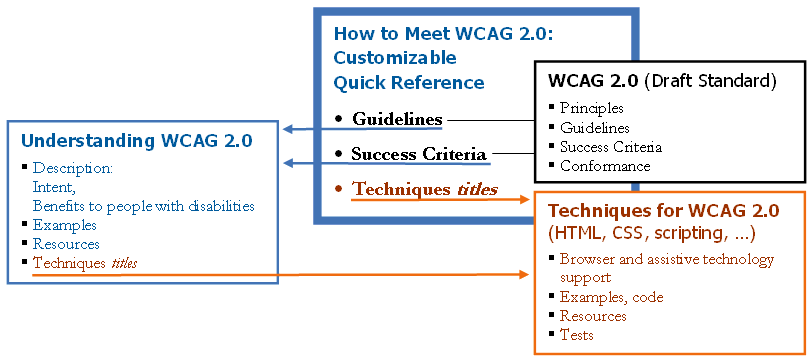Trend #1
The Web is becoming increasingly ubiquitous:
- Mobile technologies
- Technology convergence
- The Web is everywhere
Trend #2
The Web is becoming increasingly complex:
- Sophisticated formats
- Client-side processing
- User interface interaction
Trend #3
The Web is becoming increasingly essential:
- Education
- Workspace
- Civic participation
- Entertainment
Impact on Web Accessibility
- Solutions are becoming increasingly technical
- Requirements need to be considered from the start
- Support within the document format is essential
- Authoring tools and user agents are critical
Example: Blog Software
Blog software is essentially an authoring tool
- ...that extends user agent functionality
- ...and vice-versa
Web Accessibility Guidelines
- WCAG - Web Content Accessibility Guidelines
- WAI-ARIA - Accessible Rich Internet Applications
- UAAG - User Agent Accessibility Guidelines
- ATAG - Authoring Tool Accessibility Guidelines
Components of Web Accessibility

ALT-text example

WCAG 2.0 - Latest News
- Candidate Recommendation - testing phase
- Focusing on requirements marked as At Risk
- Expecting to go to the next stage in Q3 2008
- Expecting to finalize guidelines within 2008
ICCHP: "Bringing Accessibility to Today's Web", keynote by Michael Cooper on Friday 11 July
WCAG 2.0 Documents

Why Bother with Accessibility?
Web accessibility increases your business opportunities:
- Mobile Web users
- Elderly Web users
(there are many other benefits too)
Mobile Web Users
- Rapidly growing community EU-wide
- Often have high purchasing power
- Needs are related to accessibility
- Well-received by Web developers
WCAG - MWBP Overlap
If you have already implemented...
- WCAG, how much more to MWBP?
- MWBP, how much more to WCAG?
http://www.w3.org/WAI/mobile/
ICCHP: "Web Accessible and Mobile", presented by Alan Chuter on Thursday 10 July
Elderly Web Users
- Rapidly growing community EU-wide
- Often have high purchasing power
- Needs are related to accessibility
- Requirements not well understood
WAI-AGE Project
Objectives of the project:
- Better understand the needs
- Encourage user participation
- Develop educational resources
- Pursue standards harmonization
http://www.w3.org/WAI/WAI-AGE/
Literature Review
Over 120 scientific papers and articles reviewed:
- Needs not well understood by industry
- Needs not well understood by users
- Often don't build on previous work
- Some reflect lack of technical knowledge
http://www.w3.org/WAI/intro/wai-age-literature
Finding #1
Many requirements are indeed similar:
- Colour contrast and font size
- Navigation and orientation
- Predictability and tolerance
- Links, headings, consistency, ...
Finding #2
Many requirements are general usability:
- Low computer literacy issues
- Lack of awareness for solutions
- Overwhelmed by functionality
Finding #3
Some requirements could be extensions:
- Font and alignment
- Design and layout
- Simplified Browsers
Finding #4
Some requirements are more common:
- Less use of assistive technologies
- Often progressive deterioration
- Often multiple functional limitations
Potential Results
Literature review could contribute to the discussion of:
- Boundaries between usability and accessibility
- Needs of people with cognitive disabilities
- Role of user agents in Web accessibility
ICCHP: "Web Accessibility for Older Users" presented by Andrew Arch on Thursday 10 July
Conclusion
Older users, mobile surfers and other trends show that:
- The Web is becoming inceasingly ubiquituous, complex, and essential
- Accessibility solutions are becoming increasingly sophisticated
- Business case for accessibility is becoming increasingly stronger
- Authoring tools and user agents are essential for the success
ICCHP: "Web Accessibility 2.0" open discussion on Wednesday 9 July
